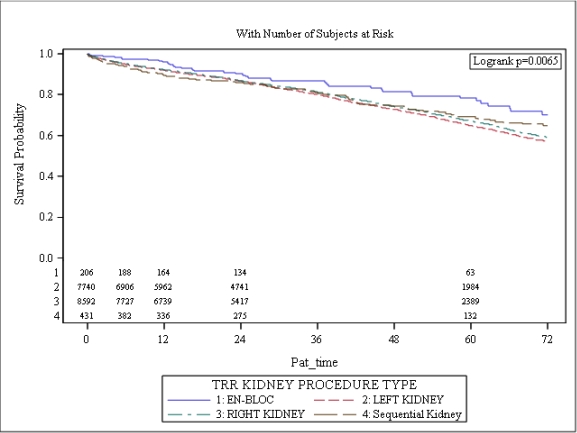Outcomes of Sequential and En Bloc Transplants in the Elderly: 10 Year Review of UNOS Data.
1Surgery, SUNY Upstate Medical University, Syracuse, NY
2Medicine, SUNY Upstate Medical University, Syracuse, NY.
Meeting: 2016 American Transplant Congress
Abstract number: B199
Keywords: Elderly patients, Kidney transplantation
Session Information
Session Name: Poster Session B: Kidney Transplantation: KDPI, HCV/Matching, Donor Age
Session Type: Poster Session
Date: Sunday, June 12, 2016
Session Time: 6:00pm-7:00pm
 Presentation Time: 6:00pm-7:00pm
Presentation Time: 6:00pm-7:00pm
Location: Halls C&D
To evaluate the outcome of sequential and en bloc transplants in the elderly.
Method: Retrospective review UNOS data 2004-2014 kidney transplant alone patients >65 years. Patient and graft survival were evaluated using the Cox regression in living and deceased donor kidney recipients. The effect of gender, recipient age (66-75 and >75), dialysis on waitlist, race, graft function, diabetes, induction therapy, maintenance immunosuppression +/- steroid, panel reactive antibodies. Kidney function as a time dependent variable was used in the cox regression for patient survival. Chi Square analysis performed on categorical variables. Patient >86 years were excluded.
Results: Over the 10 year period there were 206 (1.21 %) En bloc transplant performed in the elderly. Sequential accounted for 431 (2.54%). The median age of transplant was 69, with cold ischemic time of 17 hours for deceased donor transplants, average donor age of 49, with wait times of 712 days. For the patients transplanted with En bloc kidneys the patient survival was superior at 72 months 
For En bloc 1 year survival is 95.7% compared to 89.6% with dual. Difference statistically significant with p value <0.05. Compared to right and left kidney with 92.2% and 91.9 % one year patient survival. At 2 years: En bloc has 90%, sequential 81%, left kidney 86.6%, and right kidney 86.7% patient survival rates. At 5 years En bloc has 78%, sequential 65.85%, right kidney 66.97%, and left kidney 64.9% patient survival rates. At 6 years both sequential and en bloc and have superior patient survival.
Graft survival. En bloc kidneys 91.36, 85.25, 73.20% 1, 2 and 5 years graft survival respectively. Compared sequential have 86.13, 81.10, and 65.85 survival rates respectively. Right/left 88.82 & 88.25 1 year, 82.86 & 82.30 2 year & 63.92 and 61.82% five year graft survival.
Conclusion: En bloc kidneys have superior patient and graft survival compared to all other graft type. Sequential transplant has a significantly lower 1 year patient survival but the graft and patient survival are comparable.
CITATION INFORMATION: Whittaker V, Gruessner R, Vikram A, Gruessner A. Outcomes of Sequential and En Bloc Transplants in the Elderly: 10 Year Review of UNOS Data. Am J Transplant. 2016;16 (suppl 3).
To cite this abstract in AMA style:
Whittaker V, Gruessner R, Vikram A, Gruessner A. Outcomes of Sequential and En Bloc Transplants in the Elderly: 10 Year Review of UNOS Data. [abstract]. Am J Transplant. 2016; 16 (suppl 3). https://atcmeetingabstracts.com/abstract/outcomes-of-sequential-and-en-bloc-transplants-in-the-elderly-10-year-review-of-unos-data/. Accessed July 2, 2025.« Back to 2016 American Transplant Congress
